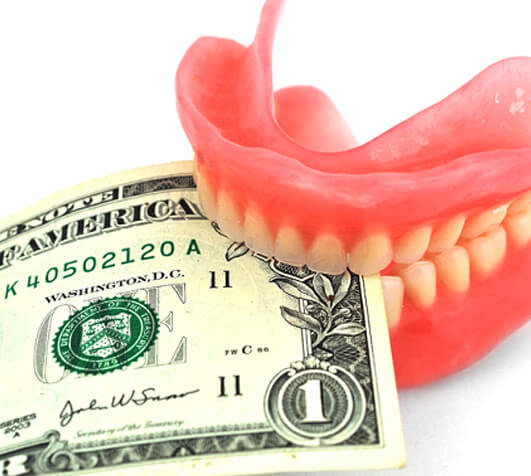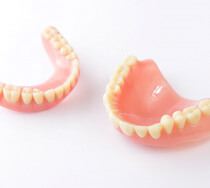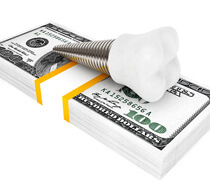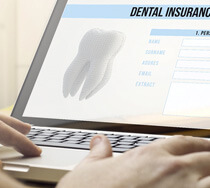Dentures – New Bedford, MA
A Dependable Solution for Replacing Missing Teeth

Tooth loss can be a difficult barrier in life and lead to feelings of low self-confidence and even depression. It not only impacts how you view yourself, but also how you move through your day-to-day life, determining what you can and can’t eat, and even affecting your speech patterns. At Sound Dentistry, our board-certified prosthodontist is a specialist at hand-crafting beautiful dentures that resemble natural teeth in both their appearance and function. Call our office today to take a stand for your well-being by restoring your smile with dentures in New Bedford.
Why Choose Sound Dentistry for Dentures?
- Experienced Board-Certified Prosthodontist
- Start-to-Finish Dental Implant Treatment
- A Passionate Dental Team with Integrity
Who’s a Good Candidate for Dentures?
Dentures can help patients experiencing different types of tooth loss, making them more versatile than many people believe they are. Whether you’re missing several teeth across your arch or an entire row, these prosthetics can be designed in ways that accommodate your unique situation, providing you with maximum functionality. We recommend dentures for patients who are looking for not only a way to rebuild their grins but also to improve their quality of life and oral and physical health.
Effects of Missing Teeth

Tooth enamel is the strangest material in the entire body! However, it isn’t completely indestructible. Teeth can become damaged and lost in a variety of different ways, including tooth decay, gum disease, and trauma to the mouth. According to the American Academy of Periodontology, there are many negative effects of tooth loss, including facial sagging, difficulty speaking, trouble eating, and low self-esteem. By replacing your missing teeth with dentures, you can improve all of these areas, resulting in a better overall quality of life.
What Qualifies You for Dentures?

Dentures are an ideal solution for people who are missing multiple, most of, or all of their teeth. Depending on the number of teeth you are missing and where they are located in the mouth, we can put together a custom plan just for you! It’s important to be in good oral health before getting dentures, so if you have any tooth decay or gum disease, they will need to be addressed beforehand. Once your existing teeth and gums are in good shape, we can plant the rest of the denture process.
Alternative Tooth-Replacement Options

If dentures aren’t something that you are interested in, you may benefit from another tooth replacement option. Here are the other ones that we offer:
- Dental Bridge: A dental bridge works by “bridging” the gap with a replacement tooth. The replacement tooth, also called a “pontic,” is supported by two dental crowns that are placed on the adjacent teeth. This is ideal for those who are only missing one or a couple of consecutive teeth.
- Dental Implants: A dental implant is a screw-like post that is surgically inserted into the jawbone to support a replacement tooth. This requires that the patient has a healthy jawbone. Dental implants have a higher upfront cost, but they are made to last for many decades or even the rest of your life.
Types of Dentures
As mentioned above, there are different types of dentures designed to aid patients facing various tooth loss situations. At your initial consultation with our board-certified prosthodontist in New Bedford, we’ll walk you through all of your appropriate tooth replacement options, which could include any of the treatments below.
Partial Dentures


Partial dentures are designed to fit between existing teeth like a puzzle piece to fill several gaps left across your arch. They’re made from several different materials, including a metal base, a gum-colored acrylic foundation, and acrylic, porcelain, or ceramic replacement teeth.
Full Dentures


Full dentures utilize natural suction to stay securely atop the gumline and replace an entire row of missing teeth. Like partials, they feature a gum-colored acrylic base and ceramic, porcelain, or acrylic replacement teeth designed to match the shade of your existing dental enamel.
Implant Dentures


To improve your prosthetic’s function, strength, and stability, we can anchor it to your mouth with anywhere from four to eight dental implants. These are small, screw-like structures that resemble tooth roots and are placed beneath the gumline and inti the jawbone. When supported by implants, dentures don’t slip or shift.
The Benefits of Dentures

With custom-crafted, beautiful new dentures in New Bedford, your quality of life will drastically improve due to all the benefits they offer. Some advantages of choosing this tried-and-true tooth replacement solution include:
Clearer Enunciation

Small gaps between your teeth can negatively impact your speaking patterns. The same happens following tooth loss! The good news is that partial and full dentures can give you the complete smile you’ve been missing. Not only will this improve your self-esteem, but it will ensure you can communicate clearly with the people you interact with.
Improves Nutrition

Following tooth loss, many patients have no choice but to adopt a soft foods diet consisting of applesauce, pudding, yogurt, and oatmeal. Fortunately, dentures are custom-made for each patient and are crafted from the highest quality dental materials. As a result, they can restore the strength of your bite and allow you to eat a more varied diet again!
Versatile Treatment

Another considerable perk of dentures is that they are versatile. So, if you are missing several teeth in a row or you don’t have any of your natural teeth left, it’s time to schedule a consultation with us to find out if this tooth-replacement option is right for you. If it is, then we will customize everything from the type of denture to the shape, size, and shade of your prosthetic teeth to ensure it looks and feels great.
Preserves Oral Health

If there is a gap in your smile – even a relatively small one – your teeth can drift out of position. This can lead to problems with the alignment of your teeth and the strength of your bite, which is why we strongly recommend exploring your tooth-replacement options sooner rather than later. Dentures are a tried-and-true solution that benefits everything from the appearance of your smile to your oral health.
Expands Opportunities

Your smile is one of the first features others notice. In fact, several studies have found that people with beautiful, healthy smiles are viewed with positive attributes, like trustworthy and friendly. This expands opportunities in both personal and professional settings so – whether you are getting back into the dating world or have your eyes set on a promotion – dentures can help!
Cost-Effective

Finally, dentures are one of the most cost-effective tooth-replacement options upfront. Not only that, but they often are partially covered by dental insurance, which makes them even more affordable. Combine that with the fact that they can last for several years with proper care, and you can see why so many patients choose them to restore their smiles!
Understanding the Cost of Dentures

One of the primary appeals of dentures is that they will be customized to perfectly fit your individual needs. While this adds a lot to the quality of the product that you’re getting, it can also make things a little bit difficult if you’re trying to determine what you’re going to pay for your prosthetic.
Of course, we’ll give you a complete estimate of what your dentures are going to cost when we meet you in person. However, if you want to know more about what you’re likely to pay for your prosthetic, here are some things you ought to know.
Factors that Affect the Cost of Dentures

While it’s not necessarily possible to know what your dentures are going to cost without knowing more about you as an individual, there are a few factors that may affect their price that you ought to know. First of all, you may need some preliminary treatments before you get your actual prosthetic. Whether you need a tooth removed or gum disease therapy ought to be considered when thinking about what you'll ultimately have to pay.
Then you should factor in the construction of the dentures themselves, including what the base and pontics are made from. We’ll talk you through the options available to you and what you'll have to pay when we meet you in person.
Are Implant Dentures More Expensive?

As you can imagine, implant dentures tend to be more expensive than traditional prosthetics; the cost of the surgery and the necessary materials naturally inflate the price of the treatment overall. However, you get a lot for your money. Implant dentures are much stronger, more stable, and have greater durability compared to other options. They also tend to outlast other prosthetics, meaning that it’s arguable that you could save money on replacements in the long run.
Does Dental Insurance Cover Dentures?

Dentures are a tried-and-true method of replacing teeth that can make an incredible difference in how you’re going to be able to live your life. Dental insurance companies are well aware of what they can do and are therefore typically willing to pay for a portion of the treatment. Depending on the nature of your plan, you can often expect to have 50% of your treatment covered. Of course, this depends on the unique nature of your plan.
Other Options for Making Dentures Affordable

Even if you don’t have insurance, there are a variety of options that can potentially make the care you receive from us more affordable. You might be interested in CareCredit, a firm that offers low-to-no-interest financing terms for patients who qualify. This can allow you to split up the cost of your dental care, making expensive treatments easier to pay for.
If you want to know more about financing or about anything you can do to make your dentures more affordable, come see us for a consultation. We’ll talk to you about your needs and what we can do to help you budget for your prosthetic.
Dentures Aftercare

Once you’ve received your new dentures, you’ll want to make sure to implement the proper measures to keep them safe and healthy for as long as possible. Even though they aren’t your natural pearly whites, taking care of them will be essential if you want to make the most of their benefits. Our team will provide you with a list of aftercare guidelines toward the end of your treatment so that you know what to do. That said, here are some important tips for taking care of your dentures.
Removable Dentures

Remove After Eating
After every meal, you’ll want to take out your prosthetics and thoroughly rinse them. Not only will this remove food particles and debris so that they appear clean, but you’ll also reduce the chances of bacteria accumulating over time. This can even help you avoid the risk of issues like gum disease and oral infection. Remember NOT to use hot water, as this can ruin the material of your dentures as well as its shape.
Clean Your Prosthetic
When it’s time to clean your dentures, whether in the morning or before bed, it’s always best to remove them. Leaving them in your mouth might allow you to clean the top surface where your artificial teeth are present, but then you won’t be able to scrub the underside of the base where it meets your gum line. Use a soft-bristled toothbrush and mild hand soap or denture cleanser. Toothpaste can be somewhat abrasive for your prosthetics. Once you’ve finished brushing them, rinse them off before wearing them again. If you aren’t going to wear them immediately after, store them in a glass of water or cleansing solution so they remain moist and retain their shape.
Keep Your Dentures Safe
To avoid losing your dentures or getting them damaged, you’ll want to place them in a location that’s inaccessible to children and pets. While cleaning them, be sure to place a towel underneath you in case they slip out of your hands. This can potentially break their fall and prevent you from needing to replace them prematurely.
Remove Dentures When You Sleep
Your gums will need time to heal after wearing your prosthetics all day. That’s why it’s best practice to take them out before bed, that way you can promote better healthy circulation and avoid gum irritation while you sleep. Be sure to also store them in a glass of water or denture cleanser so that they’re already fresh and bacteria-free when you put them back on.
Notice Changes
Once you receive your new dentures, you’ll want to keep an eye out for any potential issues or changes in your prosthetics and/or oral health. If you notice any damage or problems, notify our team for help. We’ll want to ensure your prosthetics fit correctly while also avoiding any complications arising, such as gum disease or infection.
All-on-4 Dentures

Since All-on-4 dentures are reliant on dental implants, you won’t have to remove them like you would with traditional prosthetics. Instead, you can simply brush your teeth like normal while making sure that your gum line is thoroughly cleaned in the process. You might consider using a floss threader and/or water flosser to get in between the base and gums, as this is where bacteria can settle the most. Rinse with antibacterial mouthwash to minimize the chance of plaque and tartar buildup.
Denture FAQs
Can I Sleep with My Dentures?
We strongly recommend that our patients take out their dentures each night before they go to bed. Wearing dentures, especially full dentures, can put a lot of pressure on your gums. If you don’t give your mouth a break you could develop more denture sores than usual or could cause your gum health to degrade.
It’s also common for people who don’t remove their dentures frequently to develop bacterial growth underneath their prosthetic. For these reasons, it’s a good idea to leave your dentures to soak in an antibacterial solution while you sleep.
Is It Hard to Talk with Dentures?
Most people have never had to think about how they talk, which is why people sometimes struggle to speak fluently when they first get their dentures. After you first get your prosthetic, you might find that you have a little bit of a lisp, or even that you struggle to keep your dentures in place while you speak.
That said, your dentures are designed to fit you perfectly. You might need to take a little bit of time to practice talking when you first get your prosthetic—make an effort to speak slowly and spend some time reading aloud until you’re used to your dentures. Once you’re used to it, you’ll be able to talk as well as you ever could.
What Can’t You Eat with Dentures?
Dentures can allow you to greatly expand your diet compared to what you could eat without teeth. However, there are still some foods you ought to avoid if you care about the integrity of your prosthetic:
- Sticky foods, like peanut butter and gummy candies, can potentially pull off your dentures. This creates an opportunity for food particles to creep underneath your prosthetic.
- Popcorn, nuts, and sesame seeds can be difficult to chew and may get stuck under your dentures.
- Hard foods, like apples, carrots, and corn on the cob can potentially damage your dentures.
- Tough meats (steak, porkchops, etc.) can be difficult to chew with your prosthetics, putting a lot of stress on your dentures and your gums.
Will Dentures Change the Shape of My Face?
People who have lost teeth often notice that their face begins to look a little bit older. This is because your teeth are used to support the muscles and skin on your face—without them, you’ll notice that your face will start to sag.
Well-fitting dentures remedy this issue, taking on the role your teeth used to have. This will give your face a more youthful appearance.
